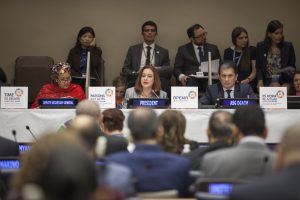– As delivered –
[Translated from Spanish]
Statement by H.E. Mrs. María Fernanda Espinosa Garcés, President of the 73rd Session of the UN General Assembly
27 September 2018

Opening of the High Level Meeting on Non-Communicable Diseases
Heads of State and Government,
Ministers
Your Excellency, Tabaré Vázquez, President of Uruguay,
Your Royal Highness, Dina Mired,
Deputy Secretary-General,
Dr. Tedros,
Excellencies, Ladies and Gentlemen,
It is a pleasure to open this high-level meeting on the prevention and control of non-communicable diseases (NCDs).
I would like to recognize the support of the World Health Organization, and other UN entities and civil societies organizations, in the very important work that preceded this session.
I would also like to commend the work of the Permanent Representatives of Italy and Uruguay, co-facilitators of the consultations on the outcome document we approved today.
Finally, allow me to recognize the role played by the members of the WHO Independent High-level Commission on NCDs, and to express appreciation for the preparatory process towards this high-level meeting.
Excellencies,
the state of NCDs today should alarm us all: 15 million people between the ages of 30 and 70 will die this year from NCDs. And most of these, at least 80%, live in developing countries. Men and women, who should be living vibrant, productive lives are dying far too early.
Not only are the poorest most likely to suffer from NCDs, but the health impacts of cancer, of diabetes, of cardiovascular diseases, and mental health conditions impair their ability to pursue social and economic activities. This reduces their ability to contribute meaningfully to local development efforts.
In fact, NCDs produce annual GDP losses of up to 6%.
To be clear: NCDs have become our biggest health challenge and are an economic sinkhole, absorbing healthcare costs faster than we can keep up with.
The reality is that NCDs are likely to affect most of us. That in itself should provide us enough motivation and urgency to prevent and control NCDs.
Excellencies,
we are all aware about the complex challenge we face, requiring action in several areas, including legislation, to manage corporate interests, and to overcome practices that for many countries are deeply ingrained.
What we need now, as we do for all our big challenges, is the political will, including for allocating resources, to achieve the bold goals we have set ourselves.
To be clear: NCDs have become our biggest health challenge and are an economic sinkhole, absorbing healthcare costs faster than we can keep up with. The reality is that NCDs are likely to affect most of us. That in itself should provide us enough motivation and urgency to prevent and control NCDs.
Friends,
bold goals require bold action. So far, our progress has consistently lagged behind our expectations.
The first high-level meeting on this topic, convened by the General Assembly in 2011, placed noncommunicable diseases on the multilateral agenda, even though they were not represented in the Millennium Development Goals.
Capacity constraints and other challenges were also not addressed with the urgency they deserved, as it was estimated at the time that noncommunicable diseases would cost developing countries $ 7 trillion between 2010 and 2025.
However, the tide is turning.
NCDs are now firmly implanted in the Sustainable Development Goals, with countries pledging to reduce, by one-third, premature mortality from NCDs by 2030 through prevention and treatment.
This is welcome progress. However, to meet this target in the next 12 years, we need immediate, urgent, and accelerated action.
Pledges, promises, and a Political Declaration are welcome and important. But even more important is when they are implemented fully, and the impact is felt in the lives of individuals and households as well as in the economy.
I therefore call on you, Heads of State and Government, and Ministers of Health, to make good on all these commitments.
And I call on the private sector to increase their contribution to SDG target 3.4 on NCDs.
We need a “whole-of-society approach” to promote action. This includes efforts to scale up the implementation of the commitments made in 2011 and 2014 to reduce tobacco use, harmful use of alcohol, unhealthy diets and physical inactivity as well as to ensure access to affordable medicines and vaccines and to implement measures to improve mental health and well-being.
We have a chance to save millions of lives.
Let us be able to look back and say—when confronted by a situation that will continue to cause illness and suffering, and decrease life expectancy at a time when it should only be increasing – that we rose to the occasion.
That we matched our rhetoric with action, our words with deeds.
Thank you.
 Making the United Nations Relevant to all People
Making the United Nations Relevant to all People